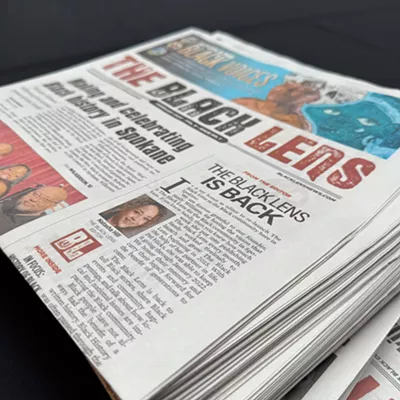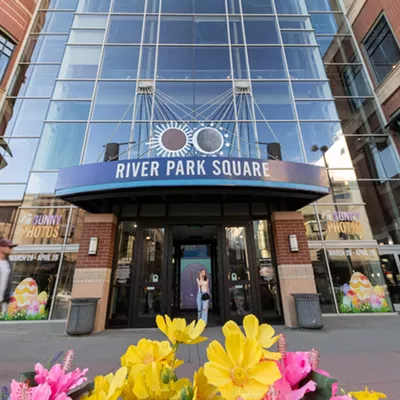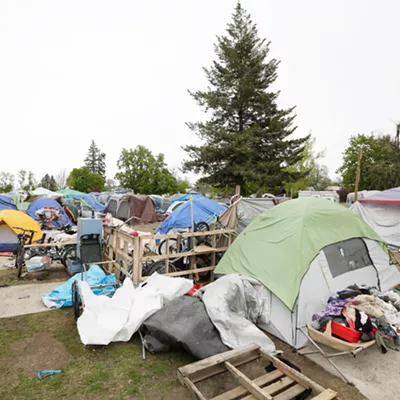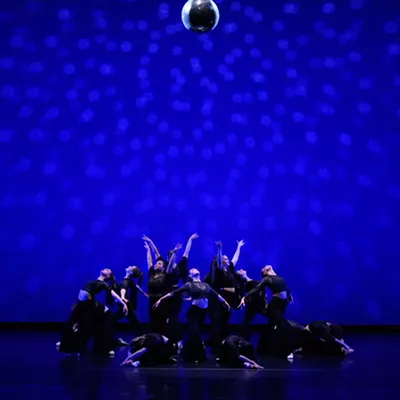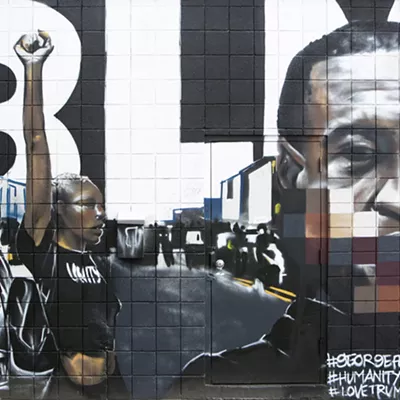Two years ago when Jillisa Winkler was looking for work, she landed a job at the Carl Maxey Center in Spokane's East Central neighborhood. At the time, she was hired by the center's founder, Sandra "Sandy" Williams, to work as a program coordinator.
The 33-year-old has deep roots in East Central, so working at the center was a dream job for her.
"I actually grew up going to the East Central Community Center, which has since been renamed the [Dr. Martin Luther King Jr.] Community Center," she says. "It's like home to me here."
Winkler had no idea that she'd be leading the Carl Maxey Center before she'd even celebrated her two-year work anniversary. Williams and her partner died in a floatplane crash on Sept. 4, 2022, and board members temporarily took the lead until Winkler's new role was announced last week.
But she's taking the promotion in stride.
"I've been working here the whole time since Sandy has been gone, so it feels not that different," she says. "But, you know, I also do feel the sense of responsibility that I didn't have a few weeks ago."
We sat down with Winkler to learn more about her goals for the center, what it means to work and live in a historically Black neighborhood, and how it feels to uphold Williams' legacy. The interview has been lightly edited for length and clarity.
INLANDER: What's going through your mind as you take the lead at the Carl Maxey Center?
WINKLER: The women before me who ran East Central, who just have been doing the work for so long. I feel like I owe it to them, and now it's my turn to help and contribute to our community. East Central feels like home to me, so I think that helps.
What does it mean to operate the center in Spokane's East Central Neighborhood?
Before the freeway was built in the '50s, East Central was a redlined area of Spokane. So it was where a lot of the Black population ended up because that was the only place they could buy homes. It ended up being a very popular neighborhood for a lot of Black folks.
When the freeway was built, it just cut the neighborhood in half, which caused a lot of change. It's been virtually uninvested in since then, so that's part of what we're trying to do here is just reinvest in this neighborhood from the inside out. We're helping to guide some of the work that happens here, rather than having it happen to us.
It was very purposeful for Sandy to put [the center] here. She definitely knew she wanted to be on Fifth Avenue because this was a corridor that's historic for Black businesses, like Larry's Barbershop that has been across the street for forever.
Could you speak about Sandy Williams' legacy in Spokane and what it means to carry that torch forward in her stead?
I think her legacy is one of just truth telling. She was a storyteller, and she would say what needs to be said, even if it wasn't the comfortable thing all the time. As far as carrying the torch, I think that none of us can fill Sandy's shoes. I try not to think of it in that way.
What does it mean to have someone like Betsy Wilkerson — who used to be the center's board president — serve as the Spokane City Council president?
In her role at the city she lets us know when something's happening. When we don't understand something we can say, "Hey, Betsy, what is this about?" She was such a good friend of Sandy's, so I think that while she also has a lot on her plate other than the center, she's still an avid supporter.
What are some of the things you're keeping in the forefront of your mind as you transition into your role as executive director?
I just want to keep my promise of all the things [Sandy and I] talked about and all the meetings we had on what she wanted that first year of the center to be. She was big on wanting to not just be a resource center, but also to have the focus on Black Spokane. So having cultural events, having our cultural library and an art gallery, and also just a gathering space is so important.
Do you have immediate plans for the center?
This year we're definitely planning to build that infrastructure that we had originally talked about with Sandy. We need to do some more strategic planning and get a realistic picture of how to roll out all of these grand ideas.
We've recently kicked back up bingo and dominoes, and the elders really love it. It's really nice to have them in the building and really get to hear their stories. Knowing these people who did the work for so long now get to relax and enjoy their time is one of my favorite things.
How long do you think the new strategic planning might take?
I think through probably the end of this year, but as it's happening, we still have all of our regular programming going. We're hoping that the library can launch soon — as an actual borrowing library. Then there's the art gallery, space rentals and events happening here, all while we're planning.
What are some of the bigger issues that are facing Spokane's Black community and how does the Carl Maxey Center work to make a difference?
I think it's multilayered but really comes from the history of that redlining in Spokane. I think that one of the things we try to do here is fill those gaps that have just been historically created. So, we do offer social services like eviction prevention, and we have a civil legal aid clinic.
Another side of it was really that cultural component of creating a gathering space and building community. I think that's something that Spokane could use because there's only 2% Black people and we're scattered across the city, so we don't always have that close-knit community feel.
It seems like there's still a lot of work to do in the region. Just a few weeks ago witnesses said racial slurs were hurled at the University of Utah women's basketball team in the streets of Coeur d'Alene. And, a month ago a newsletter from Wilson Elementary contained a racist comment asking students to dress up like slaves or hobos for a jazz concert.
We see these kinds of things all the time. Being able to hear those stories, and then figure out who you need to talk to, to take action for real, I think, is an unfortunate part of our job as advocates.
It's a privilege to be the ones to advocate for folks who feel like they can't get in the door or can't get to the table and say what needs to be said. But it is also a responsibility that we take seriously. It's not really about how I feel today, or if I don't want to go back and forth with someone, because you can't do that when you're an advocate.
Someone was asking me the other day, "What would you do if you didn't have to do that?" and I'm like, "We could actually focus on joy." ♦





